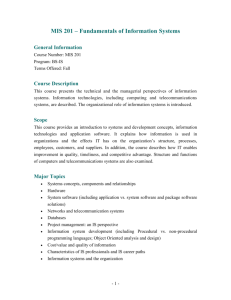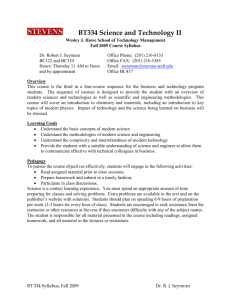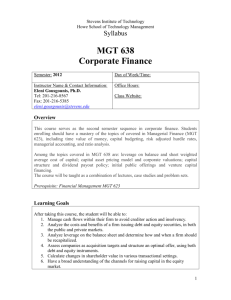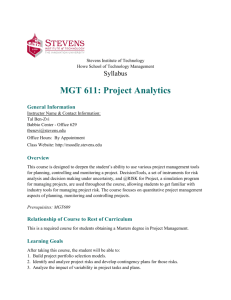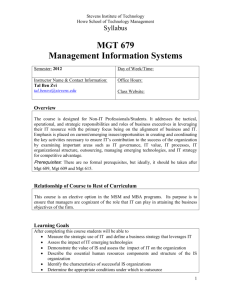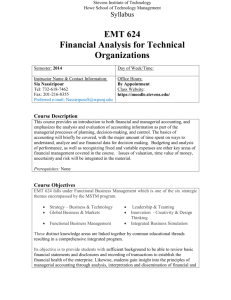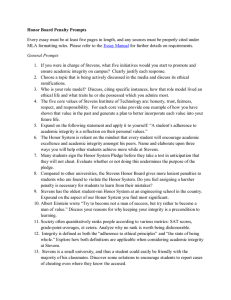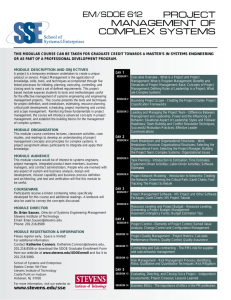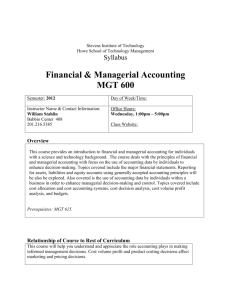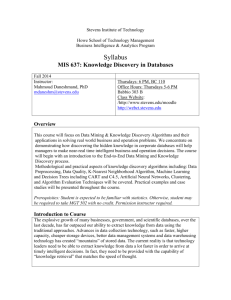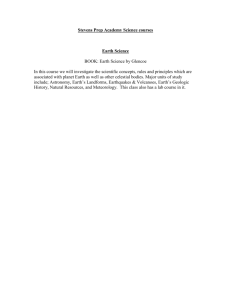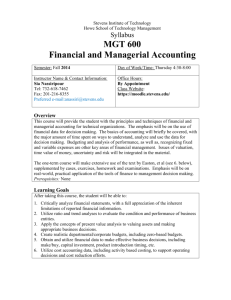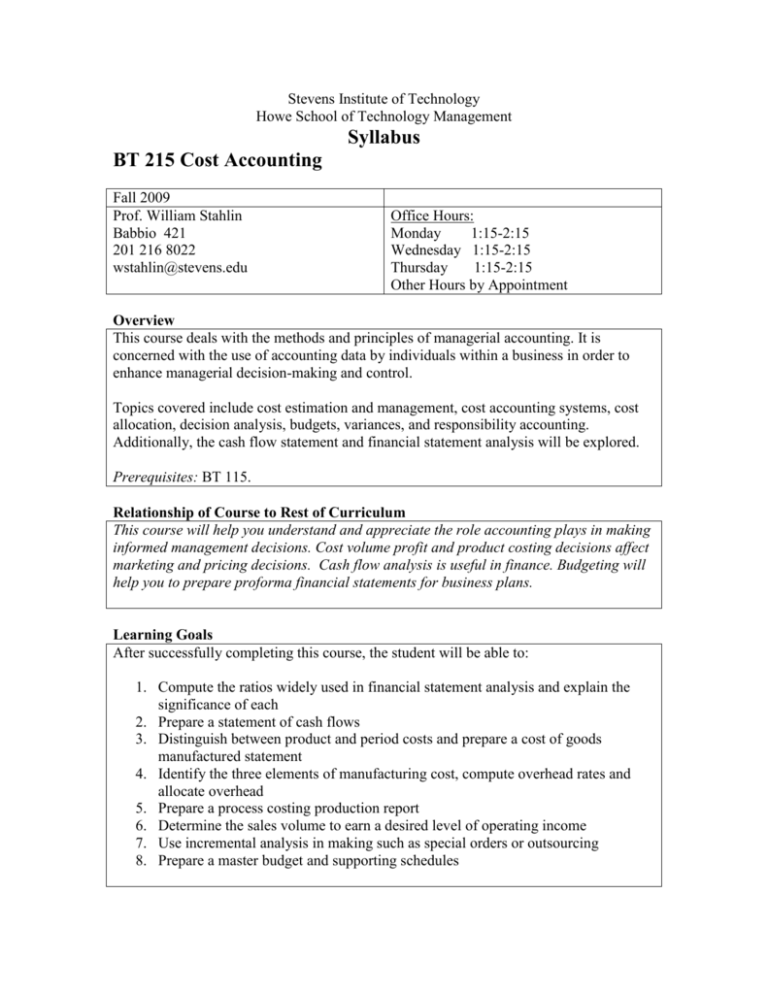
Stevens Institute of Technology
Howe School of Technology Management
Syllabus
BT 215 Cost Accounting
Fall 2009
Prof. William Stahlin
Babbio 421
201 216 8022
wstahlin@stevens.edu
Office Hours:
Monday
1:15-2:15
Wednesday 1:15-2:15
Thursday
1:15-2:15
Other Hours by Appointment
Overview
This course deals with the methods and principles of managerial accounting. It is
concerned with the use of accounting data by individuals within a business in order to
enhance managerial decision-making and control.
Topics covered include cost estimation and management, cost accounting systems, cost
allocation, decision analysis, budgets, variances, and responsibility accounting.
Additionally, the cash flow statement and financial statement analysis will be explored.
Prerequisites: BT 115.
Relationship of Course to Rest of Curriculum
This course will help you understand and appreciate the role accounting plays in making
informed management decisions. Cost volume profit and product costing decisions affect
marketing and pricing decisions. Cash flow analysis is useful in finance. Budgeting will
help you to prepare proforma financial statements for business plans.
Learning Goals
After successfully completing this course, the student will be able to:
1. Compute the ratios widely used in financial statement analysis and explain the
significance of each
2. Prepare a statement of cash flows
3. Distinguish between product and period costs and prepare a cost of goods
manufactured statement
4. Identify the three elements of manufacturing cost, compute overhead rates and
allocate overhead
5. Prepare a process costing production report
6. Determine the sales volume to earn a desired level of operating income
7. Use incremental analysis in making such as special orders or outsourcing
8. Prepare a master budget and supporting schedules
Pedagogy
The course will employ lectures, class discussion, in-class individual assignments, and
review of homework assignments. There will be approximately 5 quizzes (the lowest quiz
will be dropped and there are no make ups for missed quizzes) and three exams. The third
exam will be comprehensive.
There are 2-3 homework problems in each chapter (highlighted in bold on the
assignments schedule) that must be submitted through My Accounting Lab. In order to
get credit for your homework you must score a 75% or higher.
The other assigned problems are available through My Accounting Lab. Many students
indicated they prefer to do all homework problems through My Accounting Lab.
Solutions are available immediately once an answer is submitted. You can try problems
repeatedly with different numbers as well.
Required Texts
Accounting, 7th edition, Horngren and Harrison; Pearson Prentice Hall, 2007
ISBN 0-13-243960-3
My Accounting Lab access code (Comes with the Horngren text)
Merrill Lynch, How to Read a Financial Statement (emailed to you)
Grading Requirements
Assignment
Homework, in-class participation, assignments and
attendanceQuizzesExams (2) 20% each
Comprehensive Final
Total Grade
Grade %
15%;
15%;
40%
30%
100%
Ethical Conduct
Stevens Honor System: Enrollment into the undergraduate class of Stevens signifies a student’s
commitment to the Honor System. It is the responsibility of each student to become acquainted
with and to uphold the ideals set forth in the Honor System Constitution. All students are
reminded that, as a condition of being admitted to Stevens, they will uphold and adhere to the
standards of the Stevens Honor System. Specific student responsibilities include:
Maintaining honesty and fair play in all aspects of academic life at Stevens
Writing and signing the pledge, in full, on all submitted academic work
Reporting any suspected violations to an Honor Board member or to the Dean of
Undergraduate Academics
Cooperating with the Honor Board during investigations and hearings
2
BT 215 Course Schedule
Assigned Problems in Bold are to Be
Completed Using My Accounting Lab
Chapter Title
16
Cash Flow Statements
Class and Homework Assignments
16 – 3, 4, 5, 6, 7, 16, 17, 18, 20, 34, 35,
36
17.
Financial Statement Analysis
17 - 1, 2, 3, 4, 5, 6, 7, 8, 13, 17, 25, 26,
27
18
Management Accounting: An
Introduction
19
Job Order Cost Systems and
Overhead Allocations
18 - 3, 4, 5, 6, 7, 8, 9, 10, 11, 12, 17,
19, 20, 21, 22, 23, 24, 27, 28
19 – 1, 2, 3, 4, 6, 7, 8, 9, 10, 11, 13,
14, 15, 17, 19, 20, 22, 25, 26 (1)
Exam 1 Chapters 16, 17, 18, 19
Process Costing
20 – 2, 3, 4, 5, 6, 7, 8, 9, 10, 11, 12, 13,
19, 20, 23
21.
Cost-Volume-Profit Analysis
21 - 1, 2, 3, 5, 6, 10, 13, 14, 17, 18,
20, 21, 22, 26
22.
The Master Budget and
Responsibility Accounting
22 - 4, 5, 6, 7, 8, 9, 10, 11, 13, 14, 18
23.
Flexible Budgeting and
23 -3, 7, 8, 15, 17, 18, 20, 25, 28 (1, 4)
20.
Standard Costs
25.
Special Decisions
25 - 1, 2, 3, 4, 5, 6, 7, 15, 16, 17, 18, 20,
27, 28, 30
24.
Activity Based Costing and
24 - 2, 3, 4, 5, 6, 7, 8, 9, 10, 13, 14, 15,
16, 17
Other Cost Management Tools
Comprehensive Exam –
All Chapters
3

